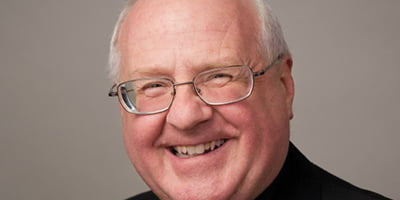
Father Mark Goldasich is the pastor of Sacred Heart parish in Tonganoxie. he has been editor of the Leaven since 1989.
by Father Mark Goldasich
Well, we’re in the midst of March Madness. For me, admittedly a marginal sports fan, the real madness seems to be how seriously people take these games. Scads of newsprint and valuable minutes of TV news have been spent lamenting the terrible showing of the Big 12 in the tournament and how embarrassing it is. My question is: to whom? And my second thought is: If this is how people judge me or the schools these basketball teams play for, that’s pretty shallow.
When all is said and done, these are just college kids playing a game. And even if bragging rights and big money are on the line for the winners, should it really matter this much? I know there are probably some people who could name the national basketball champs from the past five years in the NCAA tournament, but usually it’s forgotten by most of the nation as soon as that final buzzer sounds. It may sound harsh, but this seems like much ado about nothing particularly important or lasting.
Now, don’t get me wrong. I do enjoy watching sports. But maybe in the tendency to glorify only the winners, we’ve forgotten what sports is really all about.
There are, however, some great teachers out there on this topic, and they come from Vanguard College Preparatory School in Waco, Texas. There’s a three-minute video that’s gone viral recently . . . and it should. The clip comes from an “On the Road with Steve Hartman” segment of the “CBS Evening News,” which aired on Feb. 27. Hartman interviewed two Vanguard Vikings basketball players who refused to play against the Gainesville, Texas, Tornadoes — a team from a juvenile correction facility.
Now, the Vanguard players were not afraid of the juvenile felony offenders on the Tornadoes team, nor were they judging them. These Vanguard players simply didn’t want to play a team with no fans. One of the Tornadoes players estimated that its fan base was “close to zero.” That’s because their potential fans — their fellow offenders — can’t leave the facility, and parents of the offenders usually don’t have the time.
So, these two Vanguard players — Hudson Bradley and Ben Martinson — decided to do something. Hudson summed up the situation by saying that playing a team with no fans would be “weird, not right.” Ben added, “No one likes playing in an empty gym.”
This led Hudson and Ben to ask half of their Vikings fans for a favor during their home game: Cheer instead for the Tornadoes. Let me tell you, these fans didn’t just cheer. They made posters and even provided cheerleaders for the visiting Tornadoes. As the visitors came onto the court, they were met by a gauntlet of high-fiving fans. The players, who had no idea what was going on, looked stunned.
During the game, every good play of the Tornadoes and every basket were met with applause and cheers and fans jumping to their feet. In fact, by the end of the game, the whole Vikings gym was cheering for the opponents . . . and Ben and Hudson could not have been happier.
During the interview, Hartman remarked, “This is not what I’ve ever seen sports be.”
Hudson replied, “I think in a way, this is kind of how sports should be.”
He went on to comment about the real impact that encouragement and support can make for anyone. We all need someone to believe in us, he added, someone who knows our mistakes and loves us anyway.
This incredible display of sportsmanship was not lost on the young offenders.
One said, “When I’m an old man, I’ll still be thinking about this.”
A second commented, “I’m probably gonna remember this for the rest of my life.”
I’ve watched this video a number of times and still get tears in my eyes. If you need a glimpse of how selfless and compassionate people can be, check out the clip for yourself. Head to YouTube and search for “high school basketball unlikely support.” The Vanguard players, students and fans will show you what true winners look like.
Incidentally, you’re probably wondering who eventually won that basketball game between the Vikings and the Tornadoes. I’ll close with the final line of that “On the Road” segment:
“As for who won the game? Obviously they (the players) didn’t care — so why should we?”

